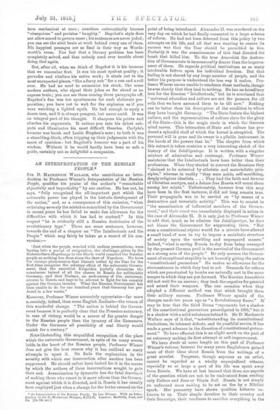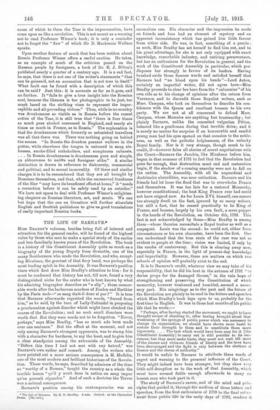AN INTERPRETATION OF THE RUSSIAN PEOPLE.* Sin D. Mecezereen WALLACE,
who contributes an intro- duction to Professor Wiener's Interpretation of the Marian People, qualifies his praise of the author's "remarkable objectivity and impartiality" by one caution. He has not, he says, " frilly recognized the all-important part which the autocratic power has played in the historic development of the nation," and, as a consequence of this omission, "when criticizing severely the mistakes committed by the Government in recent years be has failed to make due allowance for the difficulties with which it has had to contend." In this respect "he is evidently still a Russian doctrinaire of the revolutionary type." There are some sentences, however, towards the end of a chapter on " The Intellectuals and the People" which may fairly be taken se a record of his con- version:— 'Just when the people, wearied with endless persecutions, were lapsing into a polled of resignation, the challenge given by the llohenzollern-Hapsburgs to the Slavic world reunited the Russian people as nothing has done since the days of Napoleon. We have the strange phenomenon that liberals exiled by the Tsar for the first time recognize the salutary effect of the autocratic Govern- ment, that the anarchist Kropotkin joyfully chronicles the unanimous hatred of all the classes in Russia for militaristic, Germany, and that Burtsev, an arch-enemy of the autocracy-, Mares to Russia and begs to be allowed to fight for his country against the German invader. What the Russian Government has been unable to do for one hundred years that Germany has pre- &iced in a few weeks."
Moreover, Professor Wiener accurately appreciates—far more accurately, indeed, than some English Radicals—the reason of this wonderful change. " The nation id behind the Govern- ment because it is perfectly clear that the Prussian autocracy, in case of victory, would be a source of far greater danger to the Russian people than the tyranny of the Romanova. Under the Germans all possibility of real liberty would vanish for a century."
Notwithstanding this unqualified recognition of the place which the autocratic Government, in spite of its many errors, holds in the heart of the Russian people, Professor Wiener does not give the true reason why it has outlived so many attempts to upset it. . He finds the explanation in the severity with which one insurrection after another has been suppressed. He should rather have looked for it in the means by which the authors of these insurrections sought to gain their end. Assassination by dynamite has the fatal drawback of making those who resort to it more odious than the Govern- ment against which it is directed, and in Russia it has usually been employed just when a change for the better seemed on the • An rotormIntion of the Russian People. fly Leo Wiener. With an Intro- Anetion by Sir D. Mackenzie Wallace, lit,Ba.E. Loudon i McBride, Nast, and Co, [7s. O. net.] point of being introduced. Alexander II, was murdered on the very day on which he had finally consented to a large scheme of reform. He had not been deterred from this policy by two attempts on his life, and all that was wanting to ensure its success was that the Tsar should be permitted to live. Probably it was the oonsciousness of this that directed the bomb that killed him. To the true Anarchist the destruc- tion of Governments is immeasurably dearer than the improve- ment of them. He regards political institutions as so many intolerable fetters upon his individual freedom. But that feeling is not shared by any large number of people, and the better his purpose is understood the less way it makes, Pro- fessor Wiener seems unable to condemn these methods‘though he sees clearly that they lead to nothing. He has an hereditary love for the Russian " Intellectuals," but he is convinced that "universal education and culture are not the panacea for all evils that we have assumed them to be till now." Nothing can be better than his description of the condition to which they have brought Germany. " The State fosters the highest culture, and the representatives of culture slave for the glory of the State—this is the magic circle in which the German mind moves. This interaction of State and culture has pro- duced a splendid shell of which the kernel is atrophied. The personal will is gone and its owner is a pliable instrument in the hands of the powers that be." The chapter from which this extract is taken contains a very interesting sketch of the history of the Intelligent:rya, It is written with a singular mixture of admiration and contempt. Professor Wiener maintains that the Intellectuals have been better than their professions. When they started to convert the Russians they "claimed to be actuated by atheistic and materialistic prin- ciples," whereas in, reality "they were noble, self-sacrificing, deeply religious idealists. . . . They had the faith and fervour of Christian martyrs, and a future free Russia will count them among her saints." Unfortunately, however true this may have been in the first instance, it did not long remain true. Their propaganda was to be carried on " by means of a destructive and terroristic activity." This was to consist in "the assassination of influential members of the Govern- ment," and their creed was immediately displayed in action in the ease of Alexander II. It is only just to Professor Wiener to add that, much es he admires the Intent' genter, he does not blame the Government for suppressing them. "Not even a constitutional regitee would for a minute have allowed a small band of men to try to impose a socialistic structure of society upon the Inventing and unprepared masses." Indeed, "what is saving Russia to-day from being swamped by the present German peril is the survival of the Government as a strong arm of the people," He only accuses the Govern- ment of exceptional stupidity in not honestly giving the nation "constitutional guarantees." He makes no allowance for the circumstances in which they had to act. Demands for reform which are punctuated by bombs are naturally met in the same temper in which they are put forward. The Russian Anarchists did not wait for an answer ; they took the negative for granted and seized their weapons. The one occasion when they adopted a different method was that which brought them their solitary success, Professor Wiener speaks of the changes made ten years ago as "a Revolutionary fiasco." Its may be true that the third Duma "represents but a shadow of the constitutional guarantees promulgated in 1905," but it is a shadow with a solid substance behind it. Sir D. Mackenzie Wallace says of it that, "notwithstanding its constitutional limitations, its inherent defects, and its youthful errors, it has made a great advance in the direction of constitutional govern- ment." To have effected this is no slight merit on the part of an autocracy making its first attempt at self-improvement.
We have dwelt at some length on this part of Professor Wiener's volume, because for many years Englishmen gained most of their ideas about Russia from the writings of a great novelist. Turgenev, though supreme as an artist, cannot be regarded as a wholly unprejudiced witness, especially as so large a part of hia life was spent away from Russia. We have at last learned that there are aspects of the question which are not to be understood from reading only Fathers and Sons or Virgin Soil. Russia is not simply an unformed mass waiting to be set on fire by a Nihilist spark. Her peasantry have shown qualities hitherto en- known to us. Their simple devotion to their country and their Sovereign, their readiness to sacrifice everything in the
cause of which to them the Tsar is the impersonation, have come upon us like a revelation. This is not meant as a warning not to read Professor Wiener's book; it is only a reminder not to forget the " flaw " of which Sir D. Mackenzie Wallace speaks.
Upon another feature of much that has been written about Russia Professor Wiener offers a useful caution. He takes, as an example of much of the criticism passed on the Russian people by foreigners, a book of Dr. E, J. Dillon's published nearly a quarter of a century ago. It is a sad fact, he says, that there is not one of the writer's statements " that can be gainsaid, not an accusation that is not true in itself." What fault can be found with a description of which this can be said P Just this: it is accurate so far as it goes, and no further. It "fails to give a true insight into the Russian soul, because the likeness is too photographic to be just, too much based on the striking vices to represent the imper- ceptible and all-pervading virtues." Thus, while in no country was drunkenness so visible as in Russia before the recent action of the Tsar, it is still true that "there is four times as much pure alcohol consumed in England, and nearly six times as much in France, as in Russia." The explanation is that the drunkenness which formerly so astonished travellers was all that there was. There was nothing going on behind the scenes. "In Russia the drunken peasant wallows in the gutter, while elsewhere the tongue is unloosed in snug ale- houses, smoke-filled rathskeller', and sumptuous cabarets. . . . In Russia drunkenness is drunkenness pure and simple, an abhorrence to natite and foreigner alike." A similar distinction is drawn in reference to dishonesty, commercial and political, and to sexual immorality. Of these and similar charges it is to be remembered that they are all brought by Russians themselves, and that, while the unreserved frankness of the Slav " may have its beneficent effect at home," it " needs a correction before it can be safely used by an outsider." We have not space to deal with Professor Wiener's enlighten- ing chapters on Russian literature, art, and music. We can but hope that the one on literature will further stimulate English and Scottish publishers to give us good translations of really important Russian books.



































 Previous page
Previous page